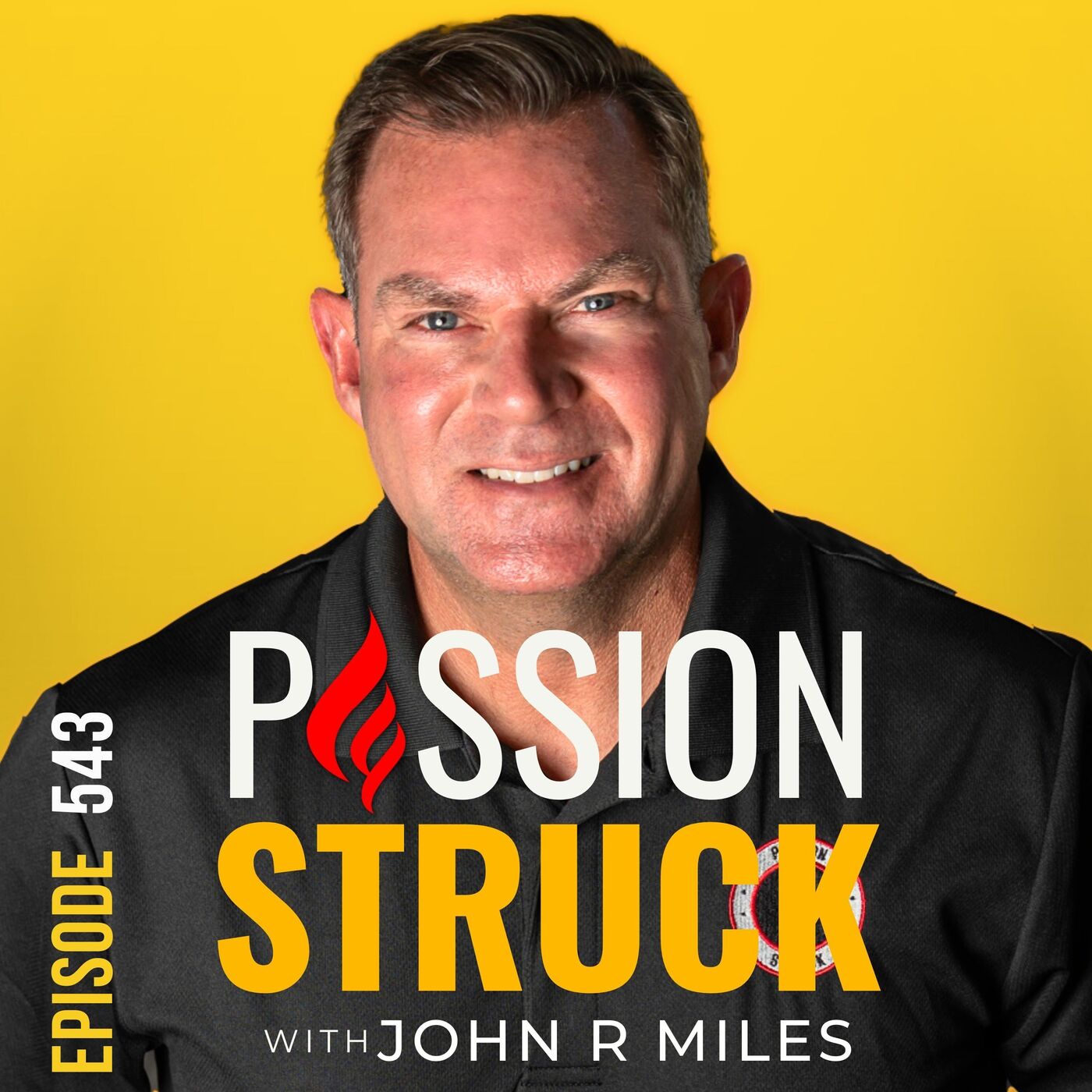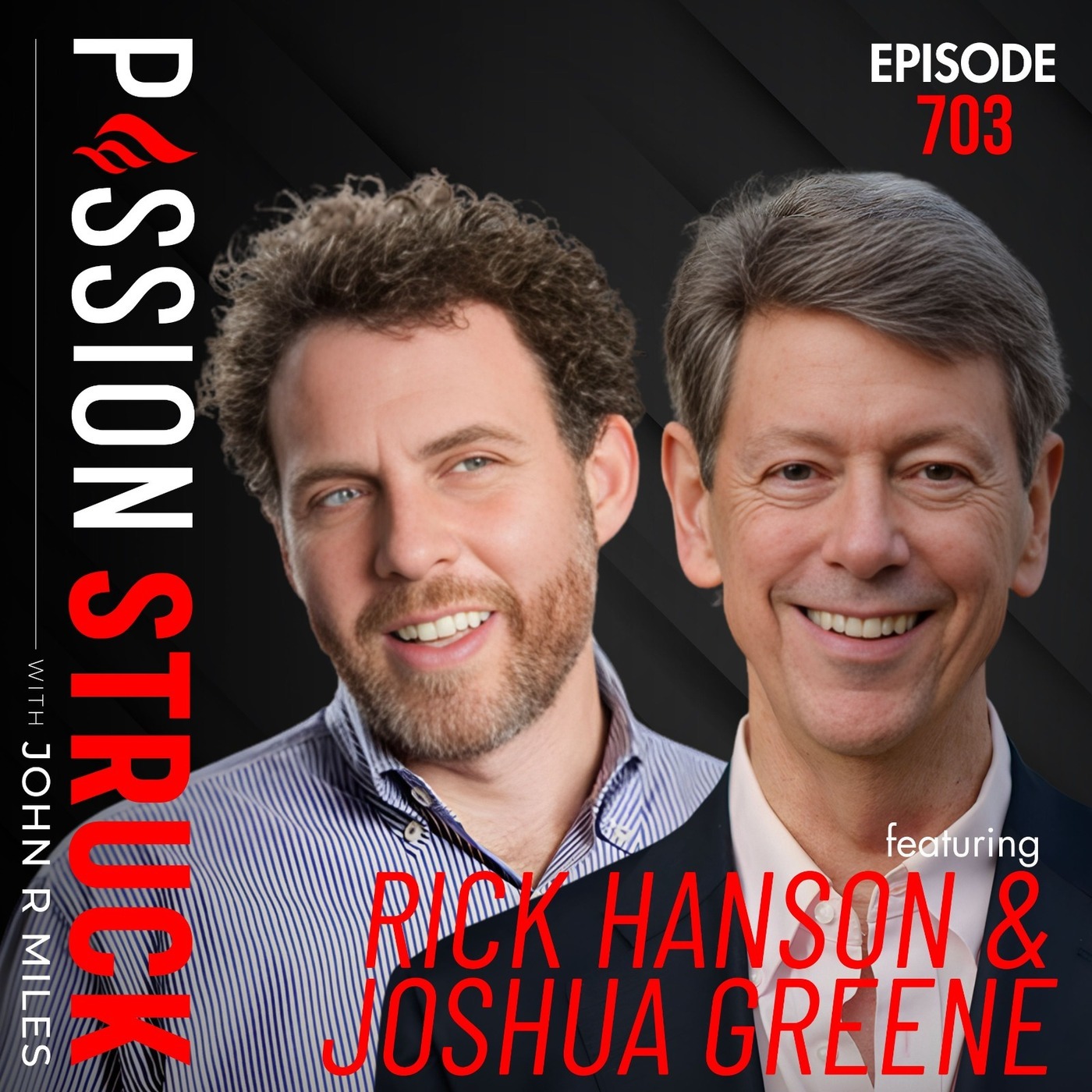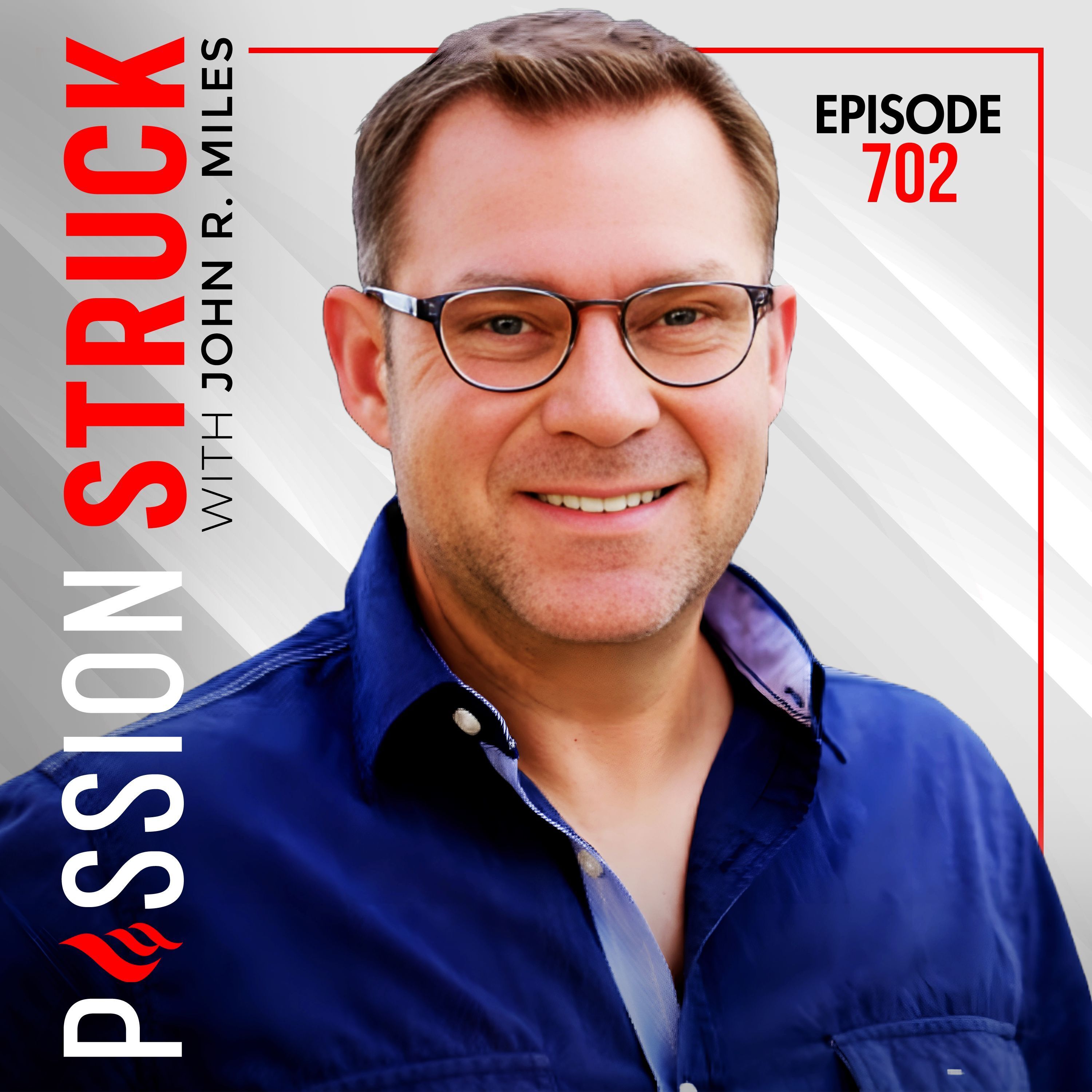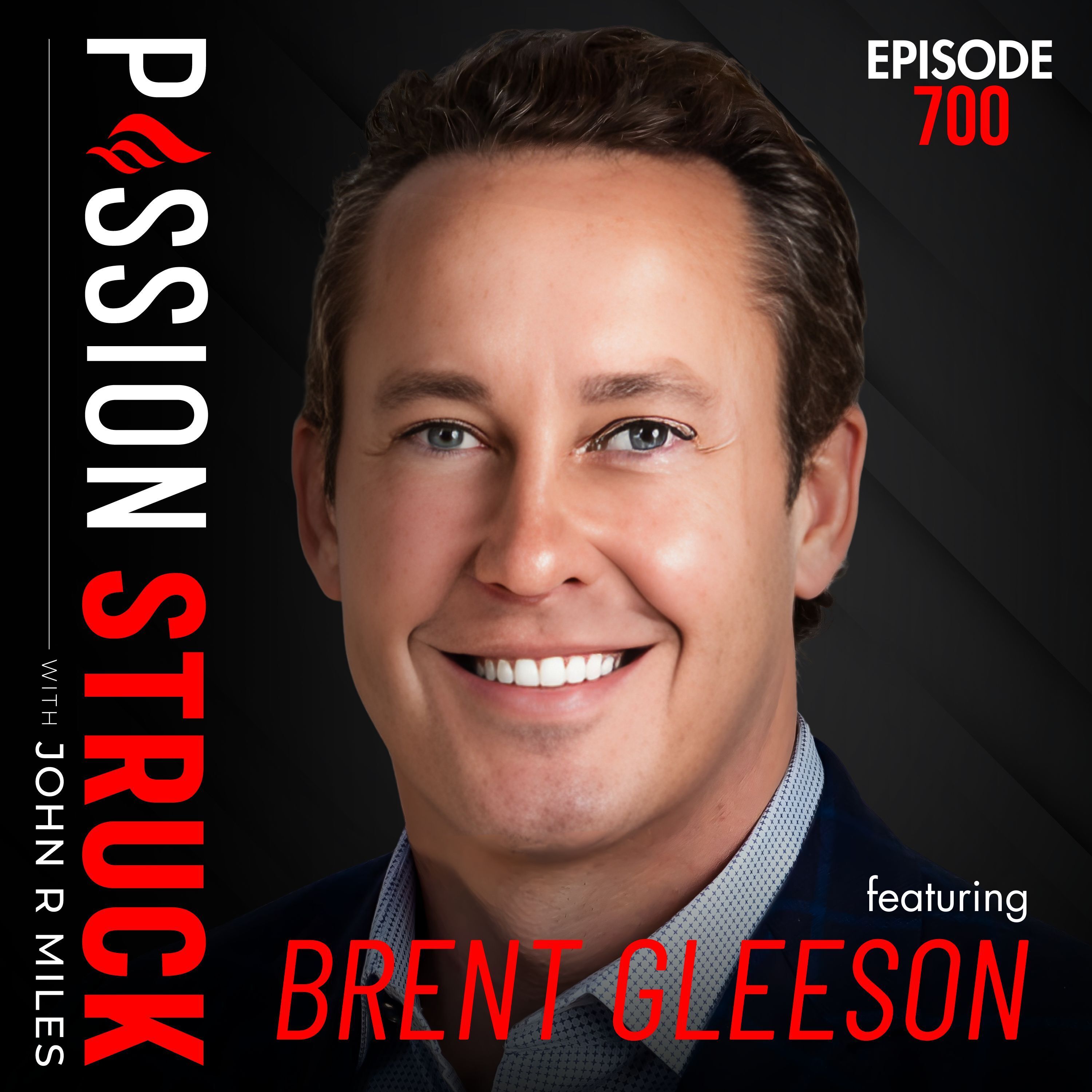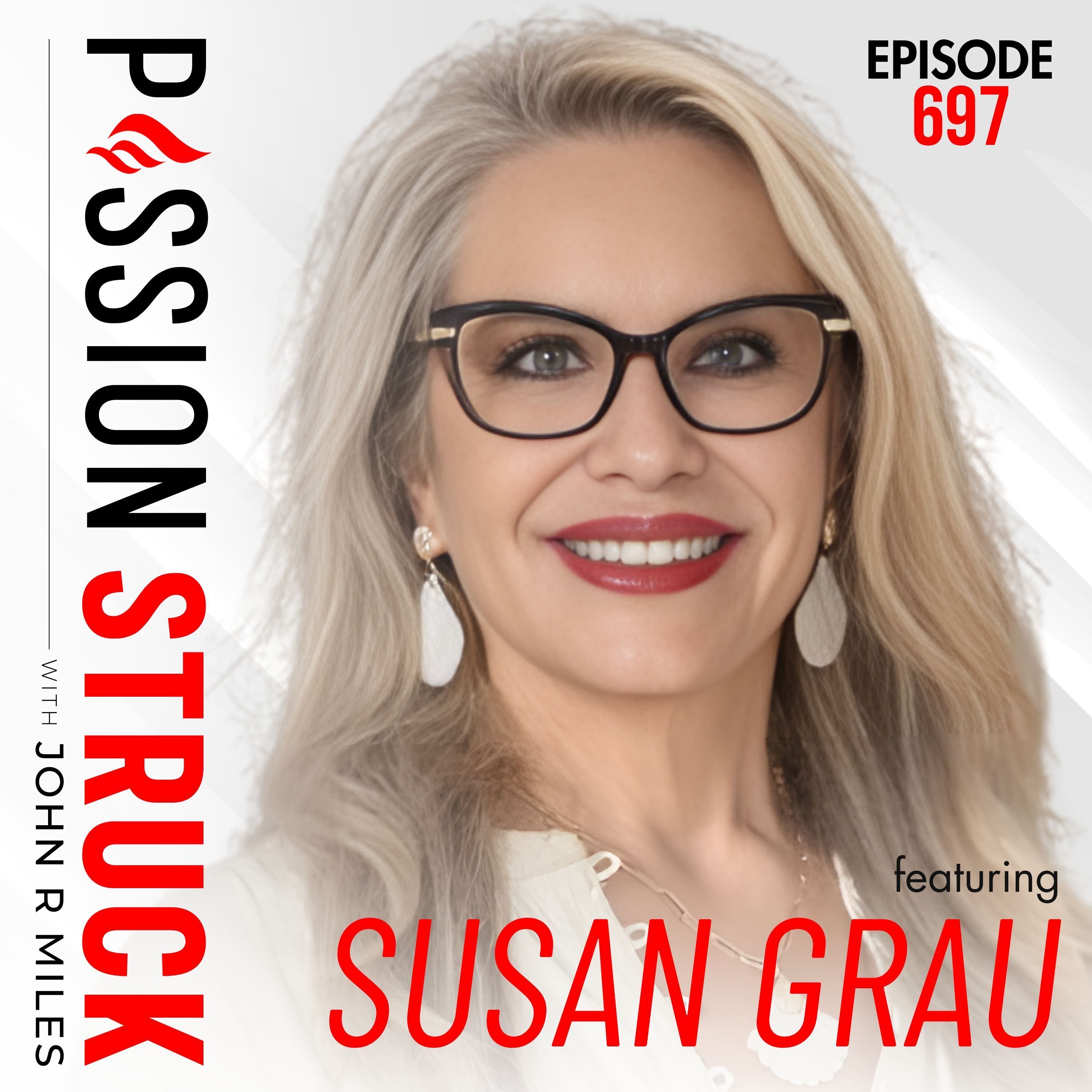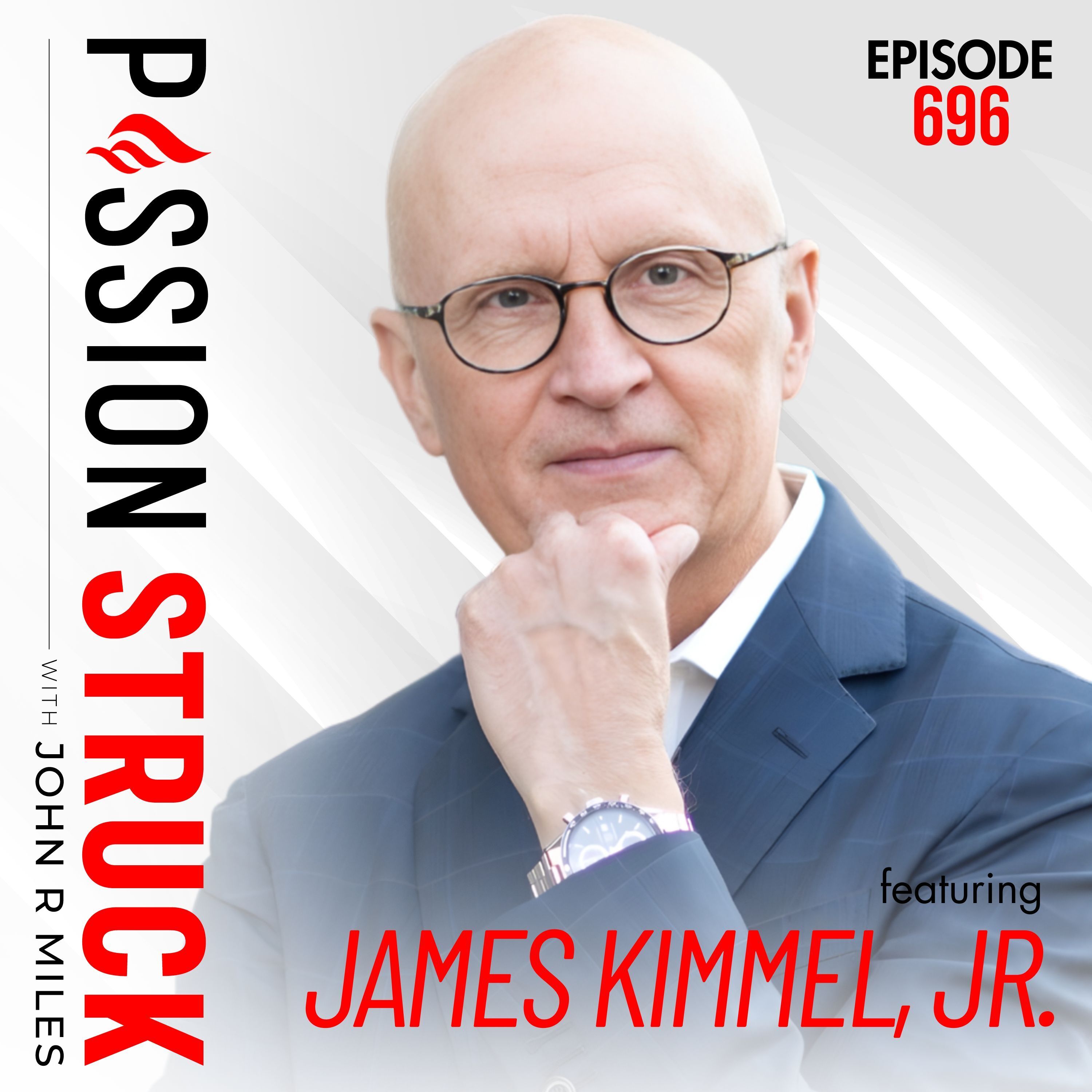4 Inspiring Ways to Bridge the Gap Between Theory and Action | EP 543
Press play and read along
Transcript
Speaker 1
Coming up next on Passion Struck, let's be real. Most of us already know what we should be doing.
We've read the books, watched the videos, maybe even made a list or two.
Speaker 1 But knowing isn't the problem, it's the doing. In this episode, we're cutting through the fluff and tackling the hard truth, why you're stuck and how to get out of your own way.
Speaker 1 It's not about waiting for motivation or the perfect moment. It's about creating momentum even when you don't feel ready.
Speaker 1 If you've ever wondered why some people take off and others stay stuck, this is your wake-up call.
Speaker 1
Tune in to learn learn how to stop overthinking, start acting, and build the life you've been putting off. This one, you don't want to miss.
Let's go. Welcome to Passion Struck.
Speaker 1 Hi, I'm your host, John R.
Speaker 1 Miles, and on the show, we decipher the secrets, tips, and guidance of the world's most inspiring people and turn their wisdom into practical advice for you and those around you.
Speaker 1 Our mission is to help you unlock the power of intentionality so that you can become the best version of yourself. If you're new to the show, I offer advice and answer listener questions on Fridays.
Speaker 1 We have long form interviews the rest of the week with guests ranging from astronauts to authors, CEOs, creators, innovators, scientists, military leaders, visionaries, and athletes.
Speaker 1
Now, let's go out there and become Passion Struck. Hey, Passion Struck family.
Welcome back to Momentum Friday and episode 543. I'm so glad you're here with me today.
Speaker 1 It's always a privilege to spend this time together exploring what it means to live a life of intention and purpose. If you're new here, welcome!
Speaker 1 You have just stepped into a space dedicated to helping you live a life of meaning, passion, and action. And I'm thrilled to have you.
Speaker 1 For first-time listeners or those who want to introduce this to a friend or a family member, don't miss our episode Starter Packs.
Speaker 1 With over 540 episodes, we've curated lists on themes like leadership, mental health, and personal growth to make it easier to dive into the topics that matter most to you.
Speaker 1 Head over to passionstruck.com slash starter packs or find them on Spotify. And if you're ready to take these lessons deeper, sign up for my Live Intentionally newsletter at passionstruck.com.
Speaker 1 Each week, I'll send you actionable insights and a challenge exercise to help you stay inspired and intentional.
Speaker 1 Plus, don't forget to subscribe to our YouTube channel where you can watch all our episodes, solo insights, and highlights to keep your growth journey visual and engaging.
Speaker 1 Now, let's talk about today's episode.
Speaker 1 This week, I've been reflecting on a couple of incredible conversations I had with Cody Sanchez and Kim Scott and how they tie into something I think we've all experienced.
Speaker 1
Now tell me if this sounds familiar. You read a book, watch a TED Talk, or listen to a podcast, and you feel completely inspired.
You're ready to take on the world. But then life happens.
Speaker 1
That inspiration doesn't quite translate into action. It gets stuck in the theory stage.
I've been there and I'm guessing you have too.
Speaker 1 Here's the thing, both Cody and Kim bring something really unique to the table. They don't just share big ideas, they give you the tools to actually do something with them.
Speaker 1 Cody lays out step-by-step frameworks for building financial freedom by investing in cash-flowing businesses. Kim, she gives you practical ways to give feedback, build trust, and lead with purpose.
Speaker 1 They don't just leave you inspired, they show you how to act. So today, I want to explore this idea of bridging the gap between knowing and doing.
Speaker 1 How do we take those inspiring lessons and actually apply them in our lives?
Speaker 1 Together, we'll unpack the barriers that hold us back, like fear, overwhelm, and not knowing where to start, and find practical ways to move forward.
Speaker 1 I'll weave in insights from Cody and Kim along with actionable takeaways you can start using today.
Speaker 1 Because Passion Struck isn't about lofty ideas or abstract concepts, it's about giving you the tools to make intentional choices and create a life you're truly passionate about living. Are you ready?
Speaker 1
Let's dive in and make it happen. Thank you for choosing Passion Struck and choosing me to be your host and guide on your journey to creating an intentional life.
Now, let that journey begin.
Speaker 1 All right, let's talk about something we all struggle with, the gap between knowing and doing.
Speaker 1 It's easy to get inspired by a great idea, like starting a business or being a better leader, but then nothing happens. The idea just sits there, collecting dust, while life keeps moving.
Speaker 1 Sound familiar? This week, I had the privilege of talking with two people who don't let ideas stay in the theory phase, Cody Sanchez and Kim Scott.
Speaker 1 What struck me about both of them is how deeply they care about action. Not just talking about big concepts, but actually helping people take meaningful steps to change their lives.
Speaker 1 Take Cody, for example. She's not out here telling people to chase the next tech startup or burn themselves out trying to climb the corporate ladder.
Speaker 1
Instead, she's focused on something so practical, it's almost boring. Buying cash-flowing businesses.
You know, the ones nobody pays attention to.
Speaker 1 Plumbing companies, cleaning services, construction firms. Cody shows people step-by-step how to find these businesses, evaluate them, and make them their own.
Speaker 1 Her whole approach is about breaking wealth building into actions you can take, starting right now. Then there's Kim Scott.
Speaker 1 If you've ever struggled to give someone feedback, like you want to be honest, but you don't want to come off as a jerk, Kim gets it. She's been there.
Speaker 1 Her books, Radical Candor and Radical Respect, give you a roadmap for navigating tough conversations without losing the humanity in your relationships. One of her core ideas is this balance.
Speaker 1 Care personally, but challenge directly. And the way she explains it through stories, frameworks, and real-life examples makes you feel like, yeah, I can actually do this.
Speaker 1
Here's what ties them together. Both Cody and Kim are about moving from ideas to action.
Ideas are great, but they don't matter until we do something with them.
Speaker 1 Cody helps people take the leap into business ownership. Kim shows leaders how to build trust and respect one conversation at a time.
Speaker 1
Whether it's buying a business or giving feedback, the magic is in the action. It's not about perfection.
It's about starting, learning, and adjusting along the way.
Speaker 1 So here's where I want to go with this today. What's keeping you in the theory phase? What's stopping you from turning knowledge into action? Let's unpack that.
Speaker 1 And then let's borrow some wisdom from Cody and Kim to figure out how to move forward with intention. So let's talk about why so many of us get stuck in the theory phase.
Speaker 1 You know the one, where we get all fired up about an idea, whether it's starting a business, having a tough conversation, or making a big life change, and then nothing. We stall out.
Speaker 1 It's frustrating, and it happens to the best of us. Let's break it down because there are some pretty common culprits that keep us stuck in the theory phase.
Speaker 1 First, there's fear of failure or rejection. Let's be real.
Speaker 1 The idea of failing can be terrifying, whether it's launching something that flops or saying something that doesn't land the way you intended.
Speaker 1 The fear of failing flat on your face is enough to paralyze anyone. You start thinking, what if I try and it doesn't work? What if people judge me?
Speaker 1 And just like that, the risk of failing feels bigger than the reward of succeeding. Here's the thing though.
Speaker 1 Cody Sanchez didn't build a nine-figure business empire by avoiding risk, and Kim Scott didn't write books on candor and respect by staying quiet.
Speaker 1 They both leaned into the discomfort of failure because they knew that not trying was the real loss. Then there's the second culprit, overwhelm from too much information.
Speaker 1 Sometimes we get stuck because we don't even know where to start. There's so much information out there, and it can feel like drinking from a fire hose.
Speaker 1 Should you read another book, take another course, watch more YouTube videos, the more options you have, the harder it feels to pick a direction.
Speaker 1 This happens a lot with people who hear about Cody's work. They think, okay, buying a business sounds amazing, but how do I even start? What if I don't have the money? What if I mess up?
Speaker 1 And before they know it, they're so overwhelmed by the what-ifs that they don't even take the first step. Then there's the next culprit, lack of clear next steps.
Speaker 1
And let's talk about this one because it's huge. You have this big, exciting goal, but it feels vague and out of reach, like standing at the base of a mountain without a map.
The result?
Speaker 1 You stay where you are, not because you lack ambition, but because you're not sure how to move forward. This is where Cody and Kim come in.
Speaker 1 Cody gives you a roadmap, identify a cash flowing business, evaluate it, negotiate the deal, and scale it.
Speaker 1 Kim provides tools like her four quadrants of communication and actionable strategies for giving feedback.
Speaker 1 They both break the processes into smaller, manageable steps, so the mountain doesn't feel so impossible to climb.
Speaker 1 This idea of combining clarity with intentional action is something I explore deeply and passion struck. In the third part of my book, I introduce a concept called the bee and turtle effect.
Speaker 1 It's a principle I've seen in some of the most successful leaders and organizations, and it's about striking the balance between relentless daily productivity and a clear, long-term vision.
Speaker 1 Let me explain, what is the bee and turtle effect? Bees and turtles are very different creatures, but the best entrepreneurs and leaders borrow traits from both to create lasting impact.
Speaker 1
Think about the bee. Worker honeybees are laser focused on their short-term goals.
They make more than 100 foraging trips a day, tirelessly working to meet their daily objectives.
Speaker 1 Now think about the turtle. Sea turtles are known for their epic migrations, journeys spanning thousands of miles between feeding and nesting grounds.
Speaker 1 These trips take patience, persistence, and an unwavering focus on the long game.
Speaker 1 The most successful people find ways to embody both, the short-term urgency of the bee and the long-term vision of the turtle. So here's a personal story that emphasizes this.
Speaker 1 I have to admit, I've been stuck in the the theory phase myself. Early in my career, I had this big idea for this project that I knew could be a game changer.
Speaker 1 But every time I sat down to start, I'd freeze. What if it doesn't work? What if I'm not ready?
Speaker 1
Instead of taking action, I kept tweaking the idea, researching more, and waiting for the perfect moment. You know what happened? Nothing.
Absolutely nothing.
Speaker 1
Until I finally decided that good enough was better than perfect. Once I started applying the B and Turtle effect, I took the first messy step.
Things started to happen. So here's a relatable example.
Speaker 1 This is where Cody's perspective really hits home. A lot of people hear her talk about buying a business and immediately think, this isn't for me, I don't have the money.
Speaker 1
But Cody would argue, it's not a money problem, it's a knowledge problem. Here's what she means.
Most people never take action because they don't understand how it works.
Speaker 1 They don't know how to find a business, what financing options are available, or what questions to ask in negotiations.
Speaker 1 By avoiding the effort to gather that knowledge, they're effectively keeping themselves from the financial freedom they want.
Speaker 1 It's not that they can't do it, it's that they haven't equipped themselves to take the first step. So if you're feeling stuck in the theory phase, you're not alone.
Speaker 1
It's natural to let fear, overwhelm, or uncertainty hold you back. But here's the truth.
Staying stuck doesn't protect you from failure, it guarantees it.
Speaker 1 The only way forward is to take that first step, no matter how small or imperfect it might be. Next, we're going to break down how to bridge the gap.
Speaker 1 I want to take a closer look at the question, why is action so hard? We know what we need to do, at least in theory, but something keeps us from taking that first step.
Speaker 1 Cody and Kim have cracked the code on how to bridge that gap between theory and action.
Speaker 1 They've turned complex ideas into practical frameworks that make daunting challenges like buying a business or creating a culture of trust more achievable.
Speaker 1 Here's how we can apply their wisdom in a step-by-step framework that you can use today. Step one, clarify your vision.
Speaker 1 The first problem with taking action is that we often don't know what success really looks like.
Speaker 1 We say things like, I want to be financially independent, or I want to be a better leader, but those are abstract ideas and you can't act on something abstract.
Speaker 1 Cody is a master at defining success in concrete terms. For her, financial freedom doesn't mean chasing the next big trend or hoping for a viral startup.
Speaker 1
It's about finding cash-flowing businesses in unglamorous industries. It's specific, actionable, and ground in reality.
Kim does the same for leadership.
Speaker 1 Her idea of success is building trust and respect in workplaces, not by avoiding conflict, but by leaning into it with radical candor.
Speaker 1 Success for Kim is a leader who cares personally while challenging directly. For you, success might mean something completely different, but here's the key.
Speaker 1
Make it clear, make it tangible, and make it personal. Write it down.
Not, I want to get fit, but I want to run a 5K in under 30 minutes.
Speaker 1
Not, I want to be financially free, but I want to replace my salary with income from a business I own. Clarity drives action.
Step two, identify the first actionable step. Here's the big secret.
Speaker 1
Action isn't about solving the whole problem. It's about solving the next problem.
Cody teaches her audience to start small. If buying a business feels overwhelming, don't buy one tomorrow.
Speaker 1 Start by identifying an industry that interests you or researching local businesses for sale. Kim applies the same principle to feedback.
Speaker 1 You don't need to revolutionize your communication style overnight. Start with one conversation.
Speaker 1 Think of someone in your life who could benefit from honest feedback and practice delivering it in a way that's kind and clear.
Speaker 1 Breaking the goal into smaller, digestible steps makes the process less intimidating and much more doable. The question isn't, how do I get to the top of the mountain? It's what's my first step.
Speaker 1
The third step is to leverage tools and frameworks. One of the reasons people like Cody and Kim are so effective is that they don't just inspire action, they simplify it.
They give you tools.
Speaker 1 Cody's deal-making checklist walks you through the process of identifying, evaluating, and negotiating a business deal.
Speaker 1 Kim's radical candor quadrants help you assess your communication style and adjust it to build trust and respect. These frameworks take the guesswork out of the process.
Speaker 1 They reduce complexity and give you a clear path forward. The takeaway, you don't have to figure it all out on your own.
Speaker 1
Find the tools and frameworks that align with your goals and use them to take the next step. Step four, embrace imperfection.
Here's the part no one likes to hear.
Speaker 1 Your first step probably won't be perfect, and that's okay.
Speaker 1 Cody often reminds people that the first deal you close probably won't be your best, but it will teach you more than years of waiting ever could.
Speaker 1 Kim shares stories of leaders who hesitated to give feedback, fearing they'd say the wrong thing, only to learn that imperfect feedback is better than none at all.
Speaker 1 We often wait for the perfect moment to act, the right timing, the right resources, the right circumstances, but perfection is a myth. Progress comes from messy, imperfect action.
Speaker 1
Start small, make mistakes, and learn as you go. So why does this approach work? Behavioral science backs this up.
The hardest part of any action is simply starting.
Speaker 1
This is something we've explored on this podcast before, especially in my conversation with Dr. B.J.
Fogg in episode 388. Dr.
Speaker 1 Fogg, the founder of the Behavioral Design Lab at Stanford University and the author of Tiny Habits, emphasizes that starting small is the key to creating lasting change.
Speaker 1 He says if you plant the right seed in the right spot, it will grow without further coaxing. By taking tiny actions, we lower the barrier to entry and make it easier to build momentum.
Speaker 1 When you take that first step, you set off a chain reaction. Each small win boosts your confidence and then that confidence propels you to take on bigger challenges.
Speaker 1 This idea is echoed in Teresa Amabel's Progress Principle, which highlights how even minor progress can significantly enhance motivation and creativity.
Speaker 1 She notes, of all the things that can boost emotions, motivation, and perceptions during a workday, the single most important is making progress in meaningful work.
Speaker 1 Cody and Kim understand this deeply. Their frameworks aren't just about reaching a destination, they're about creating a journey where each step builds upon the last.
Speaker 1 By breaking down ambitious goals into manageable actions, they help us overcome inertia and make consistent progress. So why does this work?
Speaker 1 Because it transforms overwhelming tasks into achievable actions. It shifts our mindset from, I have to do everything, to, I can do this one thing right now.
Speaker 1
This approach leverages the power of small wins to create sustainable momentum. So let's turn this insight into action.
Here's your challenge. First, define your vision.
Speaker 1 What does success look like for you? Be specific. Instead of saying, I want to improve my leadership skills, consider, I want to foster a team culture where open feedback is encouraged.
Speaker 1
Write it down and make it tangible. Second, pick one small step.
Identify the next immediate action you can take. Not the entire plan, just the very next step.
Speaker 1 If your goal is financial independence, perhaps your first step is to read an article about acquiring small businesses.
Speaker 1
If you want to improve your relationships, maybe it's scheduling a conversation with someone to practice radical candor. Third, use a tool.
Equip yourself with resources that simplify the process.
Speaker 1 This could be Cody's deal-making checklist if you're exploring business acquisitions, or Kim's Radical Candor Framework to enhance your communication skills.
Speaker 1
Tools like these provide structure and clarity, making it easier to take action. Fourth, start even when it's messy.
Let go of the need for perfection.
Speaker 1
As BJ Fogg shared, embrace the messy and imperfect start. It's better than not starting at all.
Focus on making progress rather than achieving perfection.
Speaker 1
Remember, every expert was once a beginner, because here's the thing. The gap between theory and action isn't a wall.
It's just a step. And you already have what it takes to climb it.
Speaker 1 The most significant transformations begin with that first, often imperfect step forward. So sometimes the best way to understand the power of turning theory into action is through a real-life story.
Speaker 1 Change is a fascinating phenomenon. It feels intangible, elusive, a destination we dream of, but rarely know how to reach.
Speaker 1 But when you break it down, change is less about massive leaps and more about consistent, intentional steps.
Speaker 1 Nate Dukes, who joined me in episode 69 of this show, is living proof that transformation is possible, no matter how far you've fallen.
Speaker 1
His story is raw, inspiring, and a roadmap for anyone looking to create their own comeback. So let's talk about Nate's comeback story.
In his early 20s, Nate Dukes was the picture of outward success.
Speaker 1 He owned a business and seemed to be thriving, but his life was unraveling behind the scenes.
Speaker 1
A secret drug addiction consumed him, and his decisions led to broken relationships, jail time, and losing everything he'd worked for. For Nate, rock bottom wasn't a metaphor.
It was a jail cell.
Speaker 1
In that stark, quiet space, he was forced to confront a harsh reality. The life he was living wasn't the life he wanted.
Faced with this truth, Nate asked himself one pivotal question.
Speaker 1
What if I could change? The road to transformation wasn't dramatic or instant. Nate didn't wake up with his life figured out.
Instead, he started small. He made one better decision than another.
Speaker 1
He repaired broken relationships, reshaped his mindset, and rebuilt his habits. Each step created momentum.
And over time, those small, consistent actions led to a total transformation.
Speaker 1 Today, Nate is the author of You'll Never Change, a speaker, a minister, and a coach dedicated to helping others rewrite their stories.
Speaker 1 His journey is living proof that even the most difficult circumstances can be overcome with intentional choices and steady progress. Nate's story is more than inspiring.
Speaker 1
It's a masterclass in moving from knowing to doing. Here's what we can learn.
Change starts with a decision. Nate's first step towards transformation is deciding that you want it.
Speaker 1
For him, that decision happened in jail, but for most of us, it could happen anywhere. The key is to recognize that you have the power to choose differently.
Second, small wins build momentum.
Speaker 1 Research shows that the hardest part of any action is simply starting. Nate didn't try to fix everything at once.
Speaker 1 He focused on small, manageable steps, choosing better habits, making amends, and celebrating incremental progress. Those small wins built the momentum that carried him forward.
Speaker 1
Third, Nate reframed his narrative. One of Nate's biggest breakthroughs was rejecting the lie that he couldn't change.
So many of us are trapped by stories we tell ourselves.
Speaker 1 Stories about our limitations, our past failures, or our supposed inability to grow. Nate rewrote his narrative, proving that our past doesn't have to define our future.
Speaker 1 Fourth, Nate taught us to surround yourself with the right people. In his book, Nate emphasizes the importance of stepping away from toxic influences and building a community of support.
Speaker 1 The people around us shape our beliefs, influence our decisions, and ultimately affect our outcomes. If you want to change, you need people who will uplift you.
Speaker 1 This is something I also talk about in the mosquito principle. You got to get rid of those invisible influences who are around you and influencing your path in the wrong direction.
Speaker 1
Nate's story reminds me of my own journey through transformation. After leaving the military, I found myself in a different kind of alley.
Transitioning to a corporate career felt daunting.
Speaker 1 I didn't know where to start, and the gap between where I was and where I wanted to be felt overwhelming. Like Nate, I learned that the key to change wasn't waiting for a perfect moment.
Speaker 1 It was taking intentional steps no matter how small.
Speaker 1 It started by reaching out to the Naval Academy Alumni Association, learning that they had a book of all living graduates which could be used for me to reach out to them to find out if there were any jobs in their companies.
Speaker 1 That small action of reaching out to alumni graduates led to me finding a job, joining Booz Allen, and starting a career in management consulting.
Speaker 1 And just like Nate, I learned that transformation is less about giant leaps and more about consistent, purposeful gains, just as I did by contacting the Academy of Graduates and finding a job.
Speaker 1 So what does this mean for you? Nate's story, like the lessons from Cody Sanchez and Kim Scott, proves that transformation doesn't require perfection. It requires progress.
Speaker 1 So here's my challenge to you. What's one choice you can make today? to rewrite your own story? What's one small action you can take to create momentum?
Speaker 1
If Nate's journey teaches us us anything, it's this. No matter how far you've fallen, change is possible.
It starts with a decision and grows with each intentional step you take. So here's the thing.
Speaker 1 Change isn't about being perfect, having all the answers, or waiting for the right moment. It's about showing up even when it feels messy.
Speaker 1 It's about taking that first, small, sometimes scary step and trusting that the path will reveal itself as you move forward.
Speaker 1 We've explored some powerful ideas today, from Cody Sanchez's frameworks for financial independence to Kim Scott's tools for building trust and giving feedback.
Speaker 1 And we heard about Nate Duke's inspiring journey from rock bottom to redemption. Proof that no matter how far you've fallen, transformation is possible when you decide to act.
Speaker 1
But let's bring this back to you. Maybe you're sitting here thinking about a goal you've put off for too long or a change you've wanted to make but haven't had the courage to start.
I get it.
Speaker 1
Taking that first step is hard. It's vulnerable.
It's uncertain. Here's the truth though.
Staying where you are is harder. It's It's the quiet regret of not trying, the nagging question of what if.
Speaker 1
The key isn't to overhaul everything at once. It's to pick one thing, just one, and take a single step toward it.
Send the email, read the book, have the conversation. Do it imperfectly, but do it.
Speaker 1
Because as Nate's story tells us, small steps compound. Here's my challenge to you.
Think about what matters most to you right now.
Speaker 1
What's one action, no matter how small, that you can take today to move closer to it? Write it down, then take it. Not tomorrow, not next week, today.
And when you do, let me know.
Speaker 1 Tag me on social media at John R. Miles or share it with the Passion Struct community.
Speaker 1 I want to hear about the steps you're taking because every story of progress, no matter how small, has the power to inspire someone else.
Speaker 1 To support you in turning ideas into action, I've created a free downloadable resource, the Bridging the Gap Blueprint.
Speaker 1 This guide provides actionable steps to help you overcome barriers, build momentum, and start making meaningful progress towards your goals.
Speaker 1 You can download it now on PassionStru.com, along with additional tools and resources designed to inspire and empower your journey.
Speaker 1 If today's episode resonated with you, please take a moment to leave a five-star rating and review.
Speaker 1 It's one of the best ways to help others discover the show and join our mission of intentional living. And if you know someone who could benefit from today's message, share this episode with them.
Speaker 1 Together, we can spread the gift of transformation and purpose. I'm also passionate about taking these lessons beyond the podcast.
Speaker 1 Whether it's through keynote speeches, workshops, or corporate events, I'd love to bring this message of resilience, connection, and psychological wealth to your team or community.
Speaker 1 Learn more about how we can partner by visiting johnrmiles.com slash speaking. You can find links to everything discussed in today's episode in the show notes at passionstruck.com.
Speaker 1 And don't forget to watch the video version of this episode on your YouTube channel. While you're there, subscribe so you never miss a moment of inspiration.
Speaker 1 And be sure to check out our sponsors and exclusive deals at passionstruck.com slash deals. Supporting those who support the show makes all the difference.
Speaker 1 Before we wrap up, I'm thrilled to share a teaser for our next episode. I'll be joined by Jessica Zweig, best-selling author of Lightwork.
Speaker 1 Jessica's insights on embracing authenticity, increasing self-worth, and creating alignment between who you are and how you show up in the world are transformational. You won't want to miss it.
Speaker 2
The synonym for the word light is information. That's it.
Imagine yourself in a pitch black room and you switch on the light. You can see.
You can see what is factually, actually, truthfully there.
Speaker 2 Our light that's within us is our truth and the truth of who we really are.
Speaker 2 I don't just believe I know that we as human beings are limitless, are innately loved, are innately worthy, are innately powerful and quantum and abundant.
Speaker 2 That's the information, the information of truth that lives inside of all of us.
Speaker 2
And darkness isn't evil. When we we hear the word dark, we're like, ooh, that's something to be afraid of.
That's bad. It's not.
It's just lack of information.
Speaker 2
It's actually quite neutral when you think about it. When we're in a dark room, we can't see.
And when we can't see and we are in the dark, things do happen. We get scared.
Speaker 2
There is a vibration of fear in the dark. We are technically ignorant.
And what happens in ignorance? Well, we make up stories. We project things that simply aren't true.
Speaker 2 And it is in the dark that things do get dangerous if we let the dark stay dark too long.
Speaker 1
Thank you for spending your time with me today. Your commitment to living a life of purpose and impact inspires me.
And I hope this episode has added value to your journey.
Speaker 1
Remember, the fee for the show is simple. If you found value here, share it with someone else who might benefit.
Let's keep living what we learned. And until next time, live life passion-strong.
